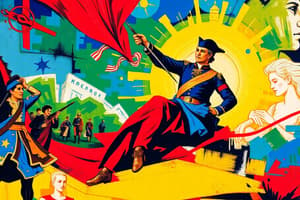Podcast
Questions and Answers
What was the most important 'commodity' sent from Africa during the Triangular Trade?
What was the most important 'commodity' sent from Africa during the Triangular Trade?
- Gold
- Slaves (correct)
- Spices
- Feathers
What was one of the few 'finished goods' sent to England from the colonies?
What was one of the few 'finished goods' sent to England from the colonies?
- Timber
- Rum (correct)
- Sugar
- Fur
What was the primary reason for Great Britain to start taxing the colonists directly?
What was the primary reason for Great Britain to start taxing the colonists directly?
- To encourage the colonists to produce more goods
- To punish the colonists for protesting
- To show its power over the colonies
- To raise money to pay for the French and Indian War (correct)
What was the result of the French and Indian War?
What was the result of the French and Indian War?
What was required of colonists by the Quartering Act?
What was required of colonists by the Quartering Act?
What was the main source of raw materials sent to England from the colonies?
What was the main source of raw materials sent to England from the colonies?
What was taxed by the Stamp Act?
What was taxed by the Stamp Act?
What was the result of the colonists' protests against the new taxes?
What was the result of the colonists' protests against the new taxes?
What was the main reason for the French and Indian War?
What was the main reason for the French and Indian War?
What was one of the goods exported from Africa during the Triangular Trade?
What was one of the goods exported from Africa during the Triangular Trade?
Flashcards
Colonial regions
Colonial regions
The 13 colonies were divided into New England, Middle, and Southern regions.
New England Colonies
New England Colonies
Made up of NH, MA, RI, and CT; mostly fishing, ship building and trade.
Middle Colonies
Middle Colonies
NY, NJ, PA, and DE; known for farming and trading various goods.
Southern Colonies
Southern Colonies
Signup and view all the flashcards
Salutary Neglect
Salutary Neglect
Signup and view all the flashcards
Triangular Trade
Triangular Trade
Signup and view all the flashcards
Slave Trade
Slave Trade
Signup and view all the flashcards
French and Indian War
French and Indian War
Signup and view all the flashcards
Colonial Protests
Colonial Protests
Signup and view all the flashcards
Cash Crops
Cash Crops
Signup and view all the flashcards
Study Notes
Colonial America
- 13 original colonies were established along the east coast of what is now the United States, divided into three regions: New England Colonies, Middle Colonies, and Southern Colonies.
New England Colonies
- Consisted of New Hampshire, Massachusetts, Rhode Island, and Connecticut.
- People lived on farms or in towns, with many working in the fishing and shipping industries.
- Citizens gathered at town meetings to discuss current issues and make laws for themselves.
- Economy was based on maritime trade, fishing, and ship-building.
Middle Colonies
- Consisted of New York, New Jersey, Pennsylvania, and Delaware.
- Had a temperate climate and large areas of rich soil, making farming an important industry.
- Some people traded goods for furs, while others made products such as paper, tools, and guns.
- New York was originally settled by the Dutch, but was taken over by the English and renamed "New York".
Southern Colonies
- Consisted of Virginia, North Carolina, South Carolina, Georgia, and Maryland.
- Were mainly agricultural, with large plantations growing crops like tobacco, cotton, and rice.
- Slaves were brought from Africa to work on these plantations.
- Chesapeake Bay was an important region in the Southern Colonies.
Slavery in the Southern Colonies
- In the 1500s, Europeans brought around 12 million Africans to the Americas to work as slaves.
- Slaves were packed tightly on ships with little food, water, or fresh air, and many died on the long sea voyage.
- Southern colonists used slaves to help them grow cash crops on their plantations.
- The life of a slave was cruel and harsh.
Triangular Trade
- A system of trade routes between England, Europe, Africa, the Americas, and the West Indies.
- Goods were traded for other goods, rather than being bought or sold.
- The Triangular Trade routes included four main routes:
- England to Africa to the Americas
- England to Africa to the West Indies
- Europe to the West Indies to the Americas
- Americas to the West Indies to Europe
- The Slave Trade was a part of the Triangular Trade, with Sir John Hawkins being a pioneer of the British slave trade.
- The Triangular Trade allowed for goods to be traded for other goods, rather than being bought or sold.
French and Indian War
- Fought between Great Britain and France from 1754 to 1763.
- Both sides asked Native Americans to join them in the fight.
- Great Britain eventually won the war, taking most of the land France claimed in North America.
Protests in the Colonies
- The French and Indian War left Great Britain in debt, leading to new taxes on the colonists.
- The Sugar Act, Stamp Act, and Quartering Act were passed, leading to protests from the colonists.
- Some colonists began discussing becoming independent from Great Britain.
Studying That Suits You
Use AI to generate personalized quizzes and flashcards to suit your learning preferences.




